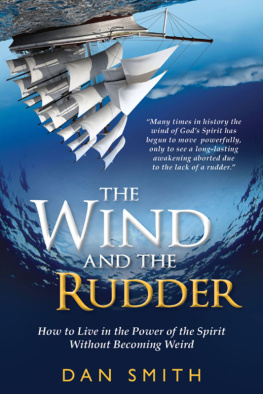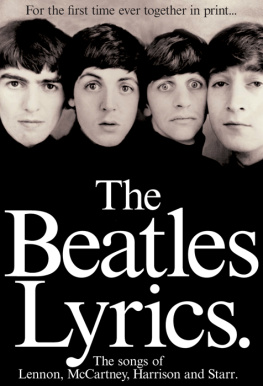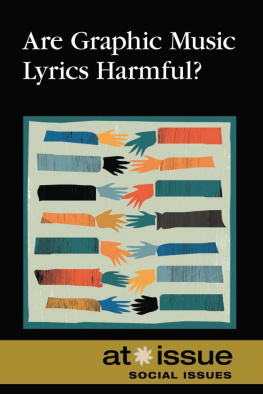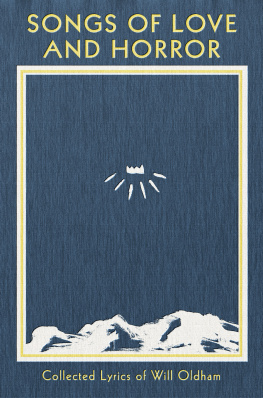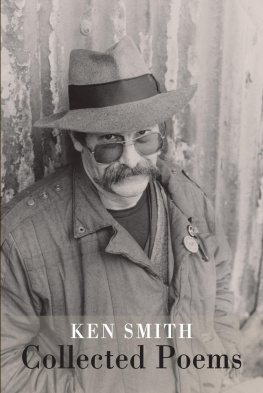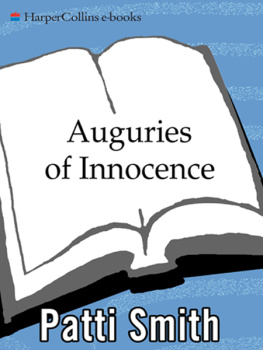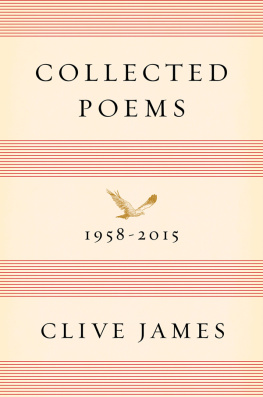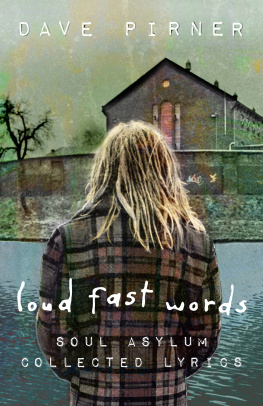Smith - Collected Lyrics, 1970-2015
Here you can read online Smith - Collected Lyrics, 1970-2015 full text of the book (entire story) in english for free. Download pdf and epub, get meaning, cover and reviews about this ebook. year: 2015, publisher: Bloomsbury, genre: Detective and thriller. Description of the work, (preface) as well as reviews are available. Best literature library LitArk.com created for fans of good reading and offers a wide selection of genres:
Romance novel
Science fiction
Adventure
Detective
Science
History
Home and family
Prose
Art
Politics
Computer
Non-fiction
Religion
Business
Children
Humor
Choose a favorite category and find really read worthwhile books. Enjoy immersion in the world of imagination, feel the emotions of the characters or learn something new for yourself, make an fascinating discovery.

- Book:Collected Lyrics, 1970-2015
- Author:
- Publisher:Bloomsbury
- Genre:
- Year:2015
- Rating:5 / 5
- Favourites:Add to favourites
- Your mark:
- 100
- 1
- 2
- 3
- 4
- 5
Collected Lyrics, 1970-2015: summary, description and annotation
We offer to read an annotation, description, summary or preface (depends on what the author of the book "Collected Lyrics, 1970-2015" wrote himself). If you haven't found the necessary information about the book — write in the comments, we will try to find it.
Smith: author's other books
Who wrote Collected Lyrics, 1970-2015? Find out the surname, the name of the author of the book and a list of all author's works by series.
Collected Lyrics, 1970-2015 — read online for free the complete book (whole text) full work
Below is the text of the book, divided by pages. System saving the place of the last page read, allows you to conveniently read the book "Collected Lyrics, 1970-2015" online for free, without having to search again every time where you left off. Put a bookmark, and you can go to the page where you finished reading at any time.
Font size:
Interval:
Bookmark:


 Bloomsbury Publishing
Bloomsbury PublishingAn imprint of Bloomsbury Publishing Plc
| 1385 Broadway | 50 Bedford Square |
| New York | London |
| NY 10018 | WC1B 3DP |
| USA | UK |
This revised, updated and expanded edition published in Great Britain 2015 Patti Smith, 1998, 2006, 2015 Because the Night 1978 by Bruce Springsteen and Patti Smith. Trampin arranged by Edward Boatner Patti Smith has asserted her right under the Copyright, Designs and Patents Act, 1988, to be identified as Author of this work. Photographs are from the authors personal collection except where credited otherwise. All rights reserved
You may not copy, distribute, transmit, reproduce or otherwise make available this publication (or any part of it) in any form, or by any means (including without limitation electronic, digital, optical, mechanical, photocopying, printing, recording or otherwise), without the prior written permission of the publisher. Any person who does any unauthorised act in relation to this publication may be liable to criminal prosecution and civil claims for damages. No responsibility for loss caused to any individual or organization acting on or refraining from action as a result of the material in this publication can be accepted by Bloomsbury or the author.
British Library Cataloguing-in-Publication Data
A catalogue record for this book is available from the British Library. ePub: 978-1-4088-6302-2 To find out more about our authors and books visit www.bloomsbury.com. Here you will find extracts, author interviews, details of forthcoming events and the option to sign up for our newsletters. In memory of Fred Sonic Smith,
19481994 The typewriter is holy the poem is holy the voice is holy the hearers are holy the ecstasy is holy! ALLEN GINSBERG, FOOTNOTE TO HOWL To Find a Voice We all have a song. A song comes spontaneously, expressing joy, loneliness, to dispel fear or exhibit a small triumph. We hardly notice we are forming them, as we sing them, often alone, half to ourselves.
The typewriter is holy the poem is holy the voice is holy the hearers are holy the ecstasy is holy! ALLEN GINSBERG, FOOTNOTE TO HOWL To Find a Voice We all have a song. A song comes spontaneously, expressing joy, loneliness, to dispel fear or exhibit a small triumph. We hardly notice we are forming them, as we sing them, often alone, half to ourselves.
It is finding the words within that leads us to sing. It might be a hymn, a shard of rebellion, or a teenage prayer. We discover inspiration where we may, in an old guitar in the corner of a garage, under a bed, or hanging in a pawnshop window. In a phrase carried to us by the wind, walking along. In the reflection we see of ourselves in the mirror. Sometimes we recognize our song in the song of another.
It is the miracle of the popular song, songs that are beloved universally, often in their simplicity. The evolution of such little songs into poetry, improvisational performance and collaboration produced these lyrics, written with great hopes to strike some chord, reaching a listener who finds their meaning within, and sings along. The first song I remember singing is Jesus Loves Me. I can picture myself singing it while sitting on a stoop in Chicago, waiting for the organ grinder to come up the street with his pet monkey. I can hear the songs that were in the air. Day-O and Shrimp Boats and Heart of My Hearts.
I can hear my father whistling Deep Purple and the voice of my mother as she sang us to sleep. I recall my first record player, only slightly larger than a lunchbox, and my two records, one red and one yellow: Tuby the Tuba and Big Rock Candy Mountain. I loved watching them spin, contemplating the worlds they evoked. But the song that produced my first visceral reaction was sung by Little Richard. It was Sunday. My mother and I hand in hand.
She was taking me to Bible school. She had kid gloves on like the White Rabbit in Alice in Wonderland. They gave her a special air and I admired them tremendously. We passed the boys clubhousetwo huge refrigerator boxes cut and pieced together. Ritchie Glasgow was spinning sides and what wafted from the hand-cut window (more for breathing than for seeing) stopped me dead in my tracks, causing me to let go of my mothers hand so abruptly as to remove her glove. I didnt know what I was hearing or why I reacted so strongly.
It wasnt Shrimp Boats or Day-O. It was something new, and though I didnt comprehend what drew me, drawn I was. Drawn into a childs excited dance. That was Tutti Frutti, so alien, so familiar. That was Little Richard. That was for me the birth of rock and roll.
For a time we lived in Philadelphia. Everyone liked to sing and dance. My sister and I would jitterbug. People sang a cappella on the street corners. When I was nine, we moved to South Jersey. My music teacher adored opera.
He would bring his albums to class and play us selections from Verdi and Puccini. I was taken with this music and I was especially moved by Maria Callas. Her emotional intensity. How she seemed to draw from every fiber to create a whisper. Her arias soared from the turntableespecially my favorite, the opera hit single Un bel d. For a time I dreamed of being an opera singer, but I didnt have the calling, the discipline, or the necessary physical frame.
My teacher, sensing my desire, gave me a glorious task. As Manrico I sang the lullaby from Verdis Il Trovatore. For a brief moment I was able to feel the troubadours expansive love for his home in the mountains. I dreamed of being a jazz singer like June Christie and Chris Connor. Of approaching songs with the lethargic charge of Billie Holiday. Of championing the downtrodden like Lotte Lenyas Pirate Jenny.
But I never dreamed of singing in a rock and roll band. They had yet to exist in my world. But my world was rapidly changing. I was privileged to evolve during an inspired period of spiritual and cultural revolution. And the music was the revolution where all had a voice and through this voice we united. Our battlefields were Ohio, Chicago, the Fillmore.
We gave new meaning to the word soldier. We were slinging an electric guitar instead of a machine gun. I broke from the confines of a rural existence. Farewell the factory, square-dance hall, the withering orchards. I headed for New York City. I had in mind to become a painter and through that pursuit I found my beat and the root of my voice.
Standing before large sheets of paper tacked to a wall, frustrated with the image Id draw words insteadrhythms that ran off the page onto the plaster. Writing lyrics evolved from the physical act of drawing words. Later, refining this process led to performance. In 1969 I moved to the Chelsea Hotel with Robert Mapplethorpe. By then I had abandoned hope of becoming a painter. I was offered work in underground theater.
It was too confining. I longed to spar with the people, to make contact. Robert encouraged me to perform my poetry. I attended readings but found them even more confining than theater. Bob Neuwirth suggested I put my lyric style to music and Sam Shepard used two pieces in his play Mad Dog Blues. On February 10, 1971, I gave my first poetry reading, opening for Gerard Malanga at St. Marks Church on the Bowery.
Font size:
Interval:
Bookmark:
Similar books «Collected Lyrics, 1970-2015»
Look at similar books to Collected Lyrics, 1970-2015. We have selected literature similar in name and meaning in the hope of providing readers with more options to find new, interesting, not yet read works.
Discussion, reviews of the book Collected Lyrics, 1970-2015 and just readers' own opinions. Leave your comments, write what you think about the work, its meaning or the main characters. Specify what exactly you liked and what you didn't like, and why you think so.





